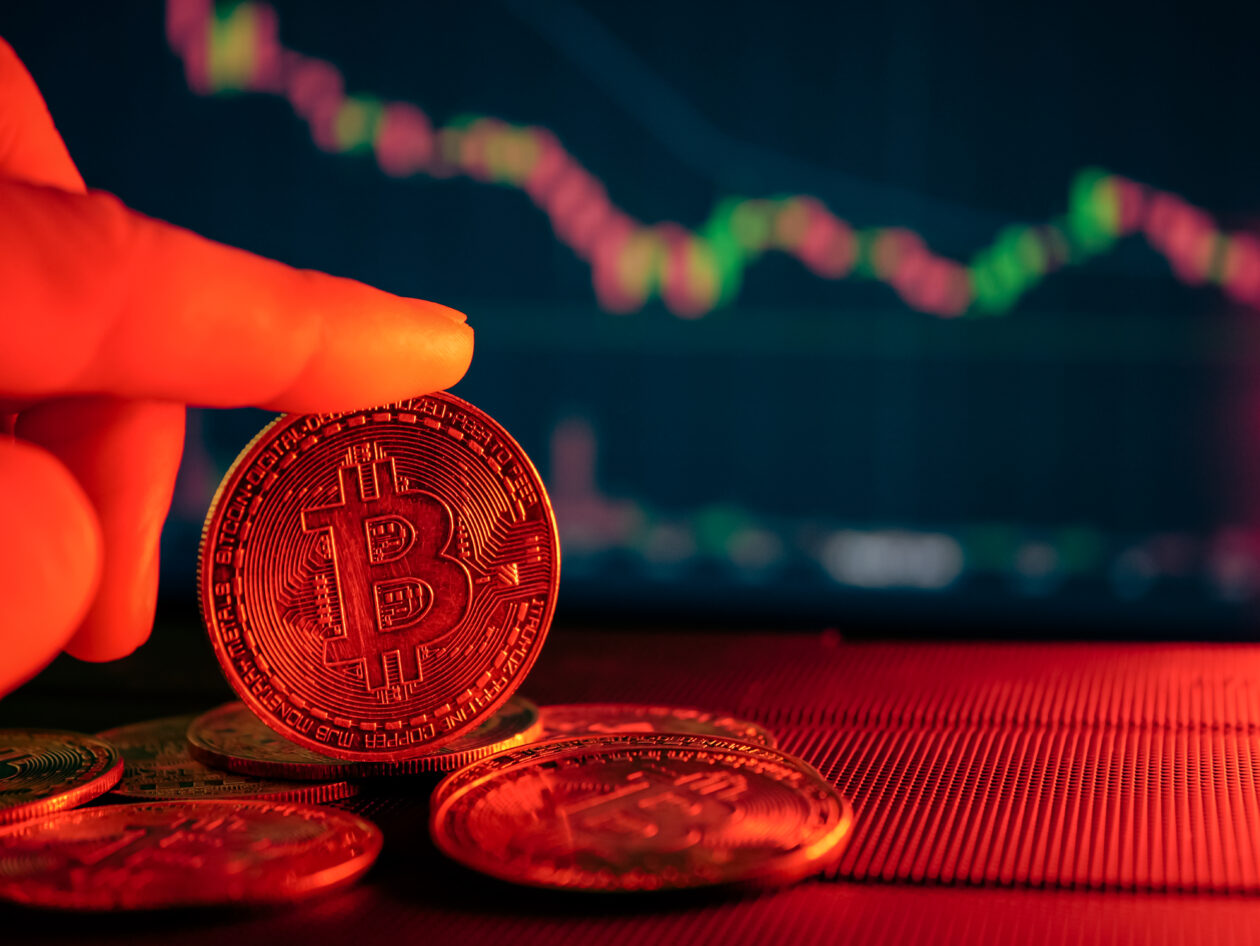Bitcoin rose slightly on Tuesday afternoon in Asia but remained below the support level of US$26,000. Ether traded below US$1,600, with XRP leading losses across most other top 10 non-stablecoin cryptos, as news of bankrupt crypto exchange FTX possibly selling its US$3.4 billion worth of crypto assets by the end of the year weighed on crypto markets. Investors are also looking forward to August inflation data from the U.S. due for release on Wednesday.
See related article: Standard Chartered’s crypto custody arm Zodia launches in Singapore
Negative sentiment across crypto market
Bitcoin gained marginally by 0.05% to US$25,819 in 24 hours to 4 p.m. in Hong Kong, bringing its weekly gains to 0.40%, according to CoinMarketCap data. The world’s largest cryptocurrency remained below the support level of US$26,000 as negative market sentiment lingered.
“The declines in cryptocurrencies came as negative sentiment continued to flow into the markets, in light of the state of anticipation of what might happen on the regulatory side of this market in the United States,” said Samer Hasn, market analyst at multi-asset brokerage firm XS.com.
The U.S. will release August inflation data on Wednesday. “The expectations are for a slight increase in year-on-year inflation, to 3.4% from 3.2% of July. However, the market does not expect any further increase in interest rates, pricing a 93% probability of no change in interest rates at the next Federal Open Market Committee (FOMC) meeting and also not predicting any further rate hike before the end of 2023,” said Matteo Greco, research analyst at the publicly listed digital asset and fintech investment firm Fineqia International.
“The end of rate hikes, especially if combined with approval of a Bitcoin Spot ETF [exchange traded fund], could represent a major driver to bring new capital into the market and improve liquidity,” Greco said in an emailed statement on Monday.
Ether, the world’s second biggest cryptocurrency, fell 1.97% to US$1,579 in the past 24 hours, and dropped 2.71% on the week.
“The break of US$1,650 makes us extremely cautious about Ether, and we could even envision a scenario where prices drop lower into year-end,” Markus Thielen, head of research and strategy at digital asset service platform Matrixport, said in an emailed report.
“A decline below US$1,500 could bring back the idea that Ether could decline to US$1,000 — a level that would appear justified based on the revenue projection from the Ethereum ecosystem,” Thielen added.
Crypto market is also under pressure as FTX crypto exchange, which went into bankruptcy in November 2022, is likely to receive court approval on Wednesday to liquidate an estimated crypto holding of US$3.4 billion. The firm proposed to sell up to US$100 million in crypto assets per week, which could be extended to US$200 million.
According to Thielen, although sales might have a cap of US$200 million per week, it still implies that FTX creditors could sell every week.
“It also indicates that crypto will see another US$3.4 billion in crypto-to-fiat off-ramping — a potential liquidity gap that might be hard to fill in the absence of Signature Bank, Silicon Valley Bank, and Silvergate Bank, which were responsible for at least, 50% of all the fiat-to-crypto on-ramping during the last few years,” Thielen pointed out.
Altcoins could be particularly impacted “due to unfavorable tokenomics that compel early investors in projects to make prudent financial and survival decisions, and liquidate positions,” he added.
FTX is not the only major player selling assets. Crypto venture capital (VC) funds are also under immense pressure to return funds to their investors.
“While some crypto VC funds made 10-20x returns, several have had substantial drawdowns, leading investors to prefer cashing out — even if returns were materially higher. For example, Multicoin Capital lost 91% of its value in 2022,” Thielen said.
Total crypto market capitalization fell 0.62% to US$1.03 trillion while market volume rose 82.81% to US$37.73 billion in the past 24 hours.
Ethereum NFT sales volume rise
The Forkast 500 NFT index fell 1.34% to 2,092.68 in 24 hours to 5.45 p.m. in Hong Kong, and dropped 3.43% over the past seven days. Forkast’s Ethereum, Solana and Polygon indexes also declined.
Total NFT sales volume rose 25.25% to US$10.81 million, while transactions gained 5.23% to 236,393, according to CryptoSlam data.
Among blockchains, Ethereum topped the rankings by sales volume, which rose 42.69% to US$5.89 million in the past 24 hours. This was followed by the Mythos network, which rose 11.65% to US$1.15 million.
The Polygon blockchain, ranked third, dropping 9.26% to US$824,236.
According to Hasn of XS.com, Binance’s intention to delist Polygon network from its NFT marketplace pushed the price of the network’s token (MATIC) to its lowest level this year.
“The delisting of Polygon from Binance NFT Marketplace adds to the series of negative news swirling in this already turbulent market, in which traders are still living in a state of anticipation about what the regulatory and legal environment might be like,” Hasn said.
Among collections, Mythos-based DMarket topped rankings with its sales volume rising 11.14% to US$1.14 million in the past 24 hours.
Global markets fall ahead of crucial U.S. inflation data, ECB policy meeting

Asian stock markets were mostly down on Tuesday in anticipation of the latest U.S. inflation data due for release on Wednesday. China’s Shanghai Composite and Shenzhen Component Index, South Korea’s Kospi and Hong Kong’s Hang Seng index dropped at the end of trading hours. Japan’s Nikkei 225 gained.
A Sept. 4-11 Reuters poll of 76 analysts, based in and outside mainland China, predicted China’s economy would grow 5% this year, lower than 5.5% forecast in a July survey. In 2024, the poll forecasts a 4.5% gross domestic product (GDP) growth for the world’s second-largest economy, and 4.3% in 2025.
“The primary culprit is the property sector. This source of growth has now evaporated and won’t be coming back,” said Julian Evans-Pritchard, head of China economics at Capital Economics in Singapore, according to the Reuters report.
India’s benchmark index Sensex rose 0.14% at the close of trading hours on Tuesday.
International Monetary Fund chief economist Gita Gopinath told India Today that India will be the world’s third-largest economy in four years. Gopinath also said the world’s most populous nation will contribute 15% of global growth this year.
A few takeaways from India’s successful @g20org presidency. pic.twitter.com/ELEWUmvm5J
— Gita Gopinath (@GitaGopinath) September 10, 2023
U.S. stock futures weakened as of 7 p.m. in Hong Kong on Tuesday. The Dow Jones Industrial Average futures, the S&P 500 futures, and the Nasdaq 100 Futures were all in the red.
The U.S. consumer price index (CPI), a key inflation indicator, for August will be released on Wednesday. The Federal Reserve Bank of Cleveland expects the inflation gauge to rise 3.8% year-on-year, up from 3.2% in July.
The latest inflation report will provide further insights into the U.S. central bank’s future monetary policies, which aims to bring the annual inflation rate below 2%. The Federal Reserve in July raised interest rates in the world’s largest economy to between 5.25% and 5.5%, the highest in the past 22 years.
The CME FedWatch Tool predicts a 93% chance the U.S. central bank will maintain the current rate unchanged in September.
European bourses – the benchmark STOXX 600 and Germany’s DAX 40 – fell in afternoon trade on Tuesday. Investors are looking forward to the European Central Bank’s (ECB) policy meeting on Thursday, which is expected to indicate whether the central bank will increase interest rates further.
“The European Central Bank would risk plunging the European Union into a long recession if it decides to raise interest rates at its pivotal meeting on Thursday, following the growth downgrades of the bloc by the European Commission,” said Nigel Green, founder and chief executive of financial management group deVere, in an email statement.
“The 0.4% contraction in Germany’s economy, coupled with the European Commission’s downward revision of growth expectations, suggests that the trajectory might be less stable than anticipated,” Green pointed out.
“Despite the risks of steering the wider EU into a recession with another rate rise, we expect that the ECB will argue it is still too soon to pause in its battle against inflation and, therefore, will go for one final hike on Thursday.”
(updates with equities section)






